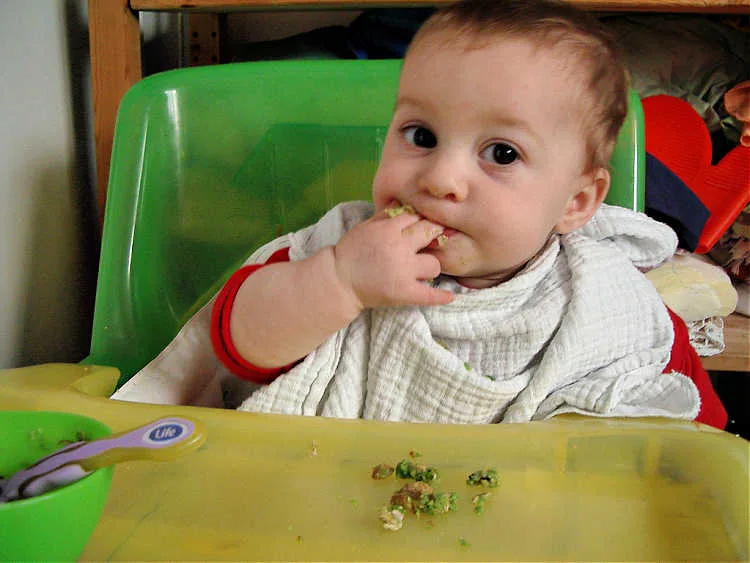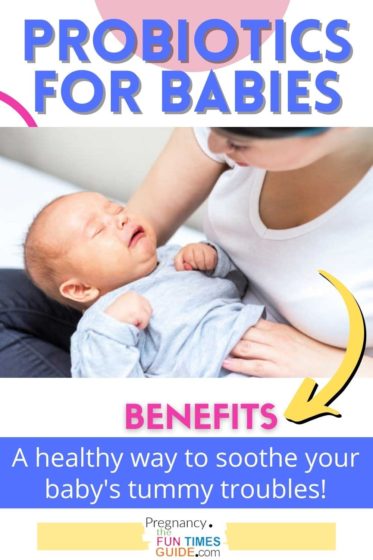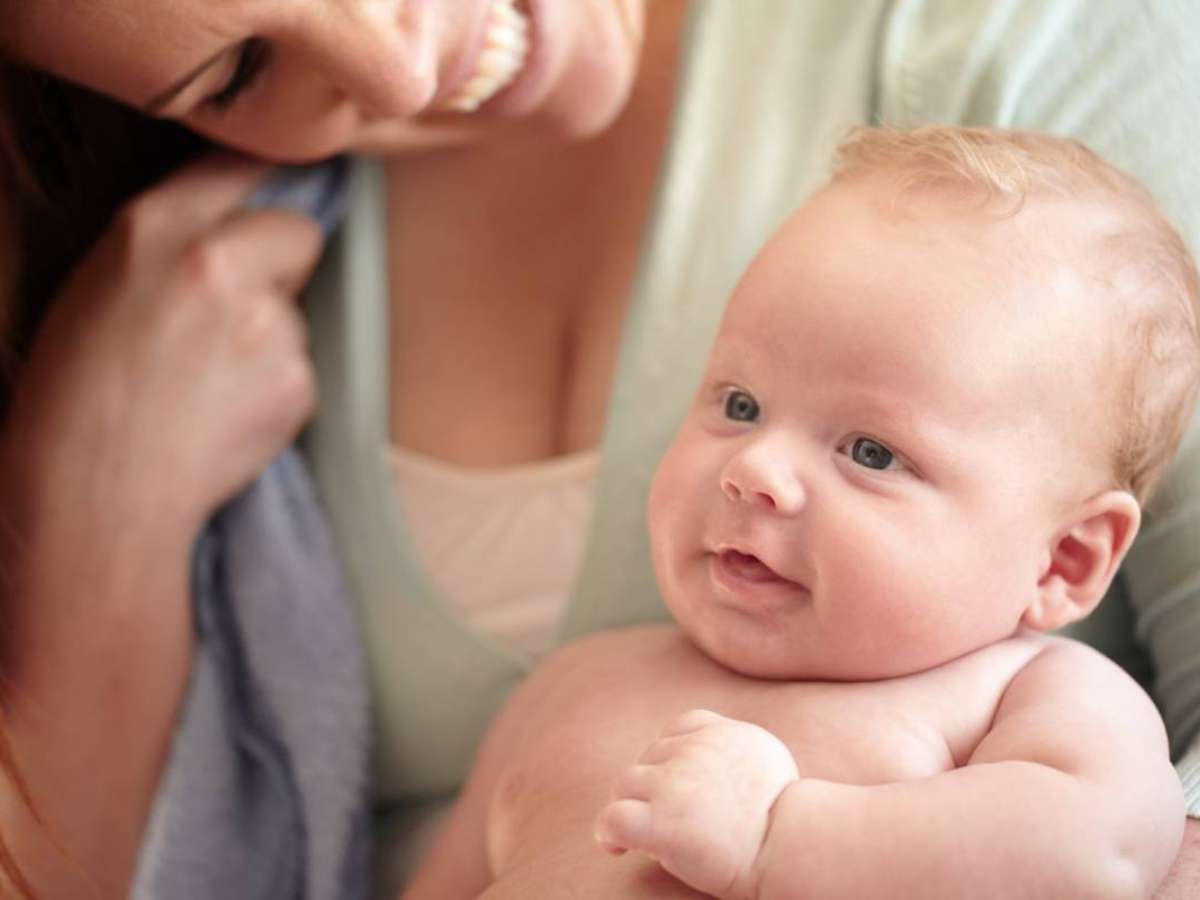Beneficial prebiotics and probiotics are the first to settle in a baby’s body.
Later come enterococci, staphylococci, and other members of the microbial world. The latter are classified as possibly pathogenic microflora. In small quantities, they are not dangerous. However, as soon as there are more of them, the baby begins to have digestive problems.
Stomach pain, gas, diarrhea, and constipation are common in infants because their gastrointestinal system is still in its infancy.

Pediatricians call this condition dysbiosis — and they typically prescribe probiotics to help the baby by putting the intestinal microflora in order.
These are the questions that concern most new parents:
- What are probiotics for babies?
- How do probiotics help with colic and other gastrointestinal disorders?
- Do baby probiotics help with other conditions too — like eczema and colds?
- What are the benefits of giving a child probiotics?
- Which probiotics are best for children under 1 year of age?
- Are baby probiotics safe?
- Do all children need probiotics?
- What’s the difference between probiotic supplements vs. natural probiotics for babies?
- How do you give a baby probiotics?
- Do breastfed babies need probiotics?
Today, we are going to help you figure it all out!
What Is Dysbiosis? And Why Does It Occur?
Modern pediatricians do not consider dysbiosis to be a disease. It is simply a condition of the mucous membranes when the average balance of microflora is disordered.
Usually, bifidobacteria and lactobacilli are present in the child’s body to protect the intestines from pathogenic microorganisms and toxins. They are also involved in digestion, the breakdown of proteins, fats, and carbohydrates, and they help to properly assimilate various acids and vitamins.
Dysbiosis begins when the number of these beneficial bacteria in relation to pathogens decreases.
Dysbiosis happens for the following reasons:
- Unformed gastrointestinal tract — In 1-month-old babies, the gastrointestinal tract system is still immature, and often there are not enough beneficial microorganisms for the intestine’s stable work. This problem can be solved by itself as the child grows up. Until then, you can help your child by giving baby probiotics that are best for microflora.
- Wrong diet — As a rule, dysbiosis affects babies who start eating different foods too early or are fed with mixtures that do not suit their age. If digestive problems begin in a breastfed baby, then the mother is not eating correctly. In this case, you need to improve your diet. Baby probiotics during breastfeeding may help you.
- Taking antibiotics — Antibiotics kill all bacteria — both pathogenic and beneficial. Therefore, if a baby or a breastfeeding mother was treated with such drugs, a microflora balance disorder occurs.
What Are Probiotics For Babies?
For starters, probiotics for babies and probiotics for adults work in exactly the same way.
While the word bacteria is often associated with harmful microorganisms that cause disease — not all of them are bad.
The human body is inhabited by various microorganisms that keep it healthy, and bacteria are involved in the following ways:
- Digestion process
- Absorption of nutrients
- Fight against other harmful microorganisms
Probiotics are good bacteria and yeasts that are essential for the normal functioning of an immature baby’s digestive tract. They populate the intestines with microflora, provide a temporary effect, and are not always compatible with the endogenous microflora.
Only 10% of the probiotic taken reaches the baby’s intestines — overcoming the acidity of the gastric juice and the digestive tract’s enzymes.
How Do Baby Probiotics Work?
Baby probiotics best act on intestinal microbes, affecting the mucosal immune mechanisms, promoting the production of useful metabolic products, and interacting with beneficial and harmful bacteria.
All of this leads to the suppression of pathogenic microbiota, an increase in the growth of beneficial bacteria, a decrease in inflammation in the intestinal wall, and a strengthening of the gastrointestinal tract barrier.
These mechanisms and effects contribute to a reduction in the frequency and severity of diarrhea –which is the most common reason for prescribing probiotics in children.
The Benefits Of Baby Probiotics
Prebiotics are not bacteria — but a breeding ground for probiotics. We get them with food. They penetrate the large intestine, where they are fermented and create ideal conditions for the bifidobacteria and lactobacilli.
Baby probiotics that are best for stimulating natural microflora growth contain components that serve as food for beneficial microorganisms present in the digestive tract.
Working together, pre and probiotics for babies are valuable in restoring digestion and normalizing overall health. (For example, there is a connection between baby probiotics and sleep disorders.)

The biggest benefits of probiotics for babies are:
- Cleansing the intestinal walls from pathogenic mucus
- Accelerating the reproduction of intestinal microflora
- Promoting the regeneration of the intestinal walls
- Preventing the development of constipation, regardless of the cause
- Maintaining normal stomach acidity
- Preventing reproduction and growth of pathogenic microorganisms
- Normalizing the intestinal peristalsis
- Relieving skin disorders (like eczema)
Here are some specific examples of baby probiotics at work…
Probiotics enhance the intestinal barrier function. How? They modify toxic components that pathogenic microorganisms produce. They also change the level of acidity in the intestines — creating unfavorable conditions for the activity of pathogens.
Probiotics contain microorganisms that are beneficial for us — like lactobacilli, yeasts, and bifidobacteria. They are part of the normal microflora and are needed for the correct functioning of the gastrointestinal tract. In other words, it is our shield against pathogens and toxins.
Probiotics are involved in the synthesis of vitamins and acids essential for the body (vitamin B12 and folic acid.) They stimulate the production of fatty acids that are important for the normal functioning of the large intestine.
The Best Baby Probiotics For Children Under 1 Year Of Age
Children’s probiotics today are presented in a wide variety, and they can be bought at any pharmacy. Although these remedies are considered safe, you should not prescribe them yourself.
Before giving probiotics to a baby, it is crucial to consult a doctor and undergo some tests to determine precisely which microorganisms are lacking and which ones are in excess.
Lactobacillus — Lactobacilli are microorganisms whose task is to suppress the pathogenic microflora in the intestines. Usually, a baby receives them with breast milk. When this is not enough, pediatricians prescribe particular medicines that help fill the lack of these bacteria and restore the normal balance of microflora.
Bifidobacteria — The microflora of a child’s intestine is almost 90% bifidobacteria. Newborns receive these microorganisms with their mother’s milk. Their importance cannot be overemphasized. Bifidobacteria improve intestinal motility, stimulate the formation of the lymphoid system, and transport essential amino acids into the body. They promote the absorption of calcium and iron – trace elements that are extremely important for the physical and intellectual development of a child. If the child’s body, for one reason or another, lacks these bacteria, they can be replenished with the help of special mixtures.
Are Baby Probiotics Safe?

Given the components that contain probiotics, they are considered safe — even for children in their first year of life.
Microorganisms that are presented in probiotics are representatives of the normal human microflora. Therefore, they are usually well absorbed.
Keep in mind that probiotics’ health benefits vary — so you should check with your pediatrician regarding when to give your baby probiotics and what dosage to choose.
Did You Know?… For research purposes probiotics are generally viewed by U.S. regulators as drugs, meaning that human studies must be conducted within the FDA’s Investigational New Drug framework — even for probiotic foods and dietary supplements that are not intended to be marketed as drugs. Source
Do All Children Need Probiotics?
Usually, nutrition mixtures already contain probiotics for babies. However, many parents wonder if their child is getting enough probiotics with food alone or if their child has so-called “dysbiosis” or intestinal microflora disorders.
So, how do you know if your baby needs to take probiotic supplements?
Well, probiotics are some of the most commonly used nutritional supplements in the world. They are often prescribed for the following conditions:
- Irritable bowel syndrome
- Violations of the intestinal microflora
- Allergic diseases
- Eczema
- After taking antibiotics
- Gastrointestinal disorders
- Colic
- Colds, etc.
Taking probiotics is a must for the following disorders:
- Constipation caused by a violation of the intestinal microflora
- Helminthic invasion
- Food allergy
- Intestinal infection
- Poisoning
- Colitis
- Enteritis (damage to the small intestine)
Probiotic Supplements vs. Natural Probiotics For Babies: Which Should You Choose?
Can a baby get probiotics from food?

Yes. Some foods contain natural probiotics, such as yogurt and cottage cheese. During the fermentation process — in sauerkraut and kefir, for example — probiotic bacteria are formed naturally.
Fermented cheeses made from raw milk are another source of probiotics. However, raw milk and foods made from raw milk should not be given to children — due to the possibility of dangerous bacteria also being included.
There is no definitive research that can answer the question, “Which is better for babies… probiotic supplements or natural probiotics?”
Getting nutrients from food is usually best. But your child may not be able to get enough beneficial bacteria from food to successfully treat the above conditions.
Keep in mind that during production and storage, live bacteria can lose their probiotic properties. The same can be said for probiotic supplements.
Instead of probiotic supplements, consider adding natural probiotic foods — such as yogurt — to your child’s diet. This will help keep your baby’s microbiome healthy. Just be sure that the yogurt contains live bacteria!
The Bottom Line
In answer to the question, “Do babies need probiotics?”…
Probiotics and prebiotics are indispensable remedies for many gastroenterological diseases in children. They allow you to normalize the child’s intestinal microbiota — which plays a significant role in many of the body’s processes.
Remember to give your baby probiotics responsibly. Do not self-medicate. If your baby has symptoms of a certain condition or disease, contact a pediatrician who will select the best probiotics for your child and tell you how to give your baby the probiotics correctly.
Did probiotics help your baby? Did you choose probiotics from food or special baby probiotic drops? Please share your experience in the comments below.
Like this post? Save it to read again later… or share with others on Pinterest!
Rachel Hudson is a therapist and gastroenterologist who studies the effect of nutrition in the early months on the formation of a child’s immunity. Rachel develops special therapeutic diets for various disorders in children and believes that a healthy diet is a key to good health throughout life.




